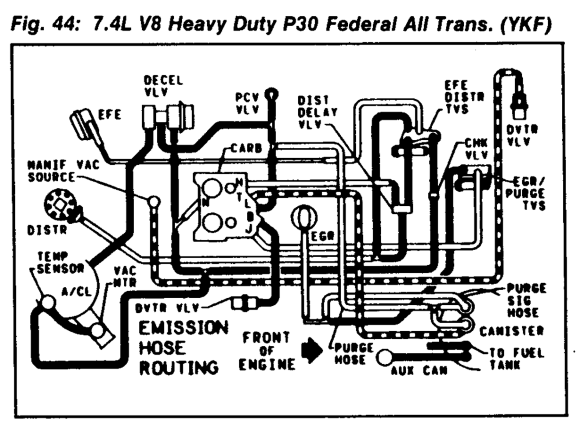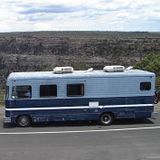Go to...  | Start A New Topic  | Search  | Notify  | Tools  | Reply To This Topic  |  |
Is there anyone out there that lives in California and has to smog there Barth every couple of years? I have a 1988 Barth Regal 22ft with the P30 chassis. It is registered as a salvage due to an electrical fire, but it was repaired and runs great (other than an overheating issue), but I having an issue passing Ca smog. I have taken it to several shops in southern ca to have them look at it and see what the issue is. I believe they said it is an air intake valve control that is missing, due the fire (diverter valve) Is there anyone out there who has an extra one that would work for my model/engine or solutions on how to get it to pass smog. HELP!!!!! | |||
|
I believe the P30's had two air pumps up to 1990 when they were eliminated and went to catalytic converters. Two AIR control valves controlled the air being pumped into the exhaust manifolds. There was some sort of a filter housing above the front right tire that fed fresh air to the pumps. Of course the EGR valve has to be in place and functioning. And all the vacuum hoses have to be in place and not leaking. Two Thermostatic Valve Switches allowed vacuum to flow after the engine warmed up, and lets not forget the EVAP system that takes in fuel vapors from the carb and gas tank and stores it until burned off in the engine. There's an EFE valve that controls or partially shuts off the right manifold exhaust port and diverts exhaust gases to the left exhaust manifold via the intake manifold for quick heating of the engine. I think there are check valves for the AIR pumps so exhaust gases won't back up into the pumps. And the timing has to be set at 4 degrees before top dead center. Look for schematics online and on here on how all that junk is pneumatically tied together. Consider replacing the radiator if it's original. Could be why you're overheating. Also replace the Fan Clutch. Look online for that part you need. Try Rockauto and other supply houses. You can always install two Catalytic Converters and call it a day. I'm sure it'll pass emissions. They're $229 each at Rockauto. My setup has none of the pollution control devices left. All have been removed including the EGR valve but I kept the EVAP system, upgrading the canister and redoing all the vacuum hoses. Good Luck  | ||||
|
 3/23 3/23 |
I have 2 A.I.R. Pumps both still function I believe, might still have the brackets that support them also. No plumbing for them or EGR valve. Let me know if you want them. Free but for shipping. They are from an 86 454 GMC motorhome chassis. Might have the brackets from my P30. If SMOG is required I agree with Jumamjii get the converters installed and if you have the cash get a TBI fuel injection system also. 1971 24 ft Barth Continental P30 chassis 350 engine | |||
|
 |
Willis! I am intimately involved in a restoration that involves these pumps. Like Duane, I have a 1986 Chevrolet chassis. One of the tough things to find, also, is the AIR tubes that need to be used. Aftermarket makes one, and for the other, you need to get lucky on Ebay. Or you will need to reengineer a solution using stock parts from the other side of the engine. You have a 1988? The engine is going to be a 1987 or a 1988, and I think that is identical to mine. I can give you the part numbers for the air pumps, the diverter valves, the check valves, and the AIR tubes. Control Module 15601546 AIR system filter canister ? Pumps driver side, 215-315, 7842360 pass side, 32255 reman number Diverter valves driver side - 17085833 passenger - 17085057 Check valves 2 needed of either 22050976 or 22049549 AIR Tubes driver side - 15520412 or 1408743 passenger - 14087433 (you do not want the skinny tubes that are easy to find) Matt 1987 Barth 27' P32 Chassis Former State Police Command Post Chevrolet 454 Weiand Manifold, Crane Cam, Gibson Exhaust | |||
|
Thanks guys. I am not a mechanic and I don't really know what I am looking at on the schematics. I just need to find someone who does. I do like the fact that there are a few people who understand my issue and can help point me in the right direction. I will be looking into the smog issue I am having and see what I can do to fix the problem. Thank you again for all your help, and if there are any more ideas, shoot them my way | ||||
|
I am very interested in these parts, hopefully those are all I need to solve my problem. Thank you. | ||||
|
Official Barth Junkie |
The emissions game is a twisted story, especially in California. Going back to the 70's the politicians tried to apply science and reduce emissions. The vehicles of the 70's and 80's were examples of the game, with car companies whining the whole way. Don't get me wrong, low emissions are a good thing. The main problem was the primitive carburetors. Ran rich on choke, on full throttle and decel. Lots of unburned fuel, and CO. Primitive ignition systems. Sadly, the auto industry already knew how to do it better and could have equipped the entire fleet with existing fuel injections systems right then. Instead we took a side trip to "parts per million" emisssion standards. This gave birth to the saying, "the solution to pollution is dilution!" Instead of addressing the source, the companies added air pumps to blow extra air into the exhaust to dilute the emissions! Did nothing to change the actual total amount emitted. It did however require numerous sensors, many vacuum lines and modules to control the pumps, choke and the ignition timing. Since agressive vacuum advance increased emissions, the timing was kept retarded much of the time. Between the retarded advance, low compression ratio, brackets, belts, hoses and vacuum lines, these were miserable engines. By the 80's the standards were rewritten to specify both ppm and GRAMS PER MILE. Dilution wouldn't work any more. The companies moaned some more, the finally did what they should have done years before, introduced fuel injection systems. Complete control of fuel supply under all temp and loads, active timing management, oxygen sensors in exhaust. They could run higher compressions for better output. Result: Reduced emissions, much better performance, no more regular tuneups, removal of gadgets and garbage on the engine. Generally very reliable. The car standards changed in 1980 but the trucks were exempted until 1990, hence our relic 80's gas coach designs. My 1986 454 had two air pumps, QJet carburetor, lots of hoses and valves, 8 to 1 compression and made 240 hp.... pitiful. I removed the emisions equipment, (Most was not working any way). It ran better. I upgraded to 90's technology with a Throttle Body Injection system. (TBI) Better performance, better mileage, less emissions. The final stage was the installation of the 454HO engine. With the 9.5 to 1 compression and TBI fuel injection it was in the neighborhood of 400 hp! mileage went from original 6.5 to 8. Sadly, all of this was available to GM in the 80's. We are stuck with dinosaur technology in the space age. In Michigan, they discontinued wide spread emissions testing. The number of older vehicles is very low and very few newer ones failed the tests. This means testing is now a moot point here. My 454HO burns cleaner than the OEM did, even when new. It would pass easily. Sadly, some states still require intact original equipment in addition to passing emission test. I think California is one such state. Even with cat convertors to pass emissions, they may not pass the whole system. Be sure to get the whole story. 9708-M0037-37MM-01 "98" Monarch 37 Spartan MM, 6 spd Allison Cummins 8.3 325+ hp | |||
|
 3/23 3/23 |
Steve so true politics or profits are bad enough separately, however when they are combined the public usually pays the tab!!!! 1971 24 ft Barth Continental P30 chassis 350 engine | |||
|
| Powered by Social Strata |
| Please Wait. Your request is being processed... |
|
This website is dedicated to the Barth Custom Coach, their owners and those who admire this American made, quality crafted, motor coach.
We are committed to the history, preservation and restoration of the Barth Custom Coach.
We are committed to the history, preservation and restoration of the Barth Custom Coach.

